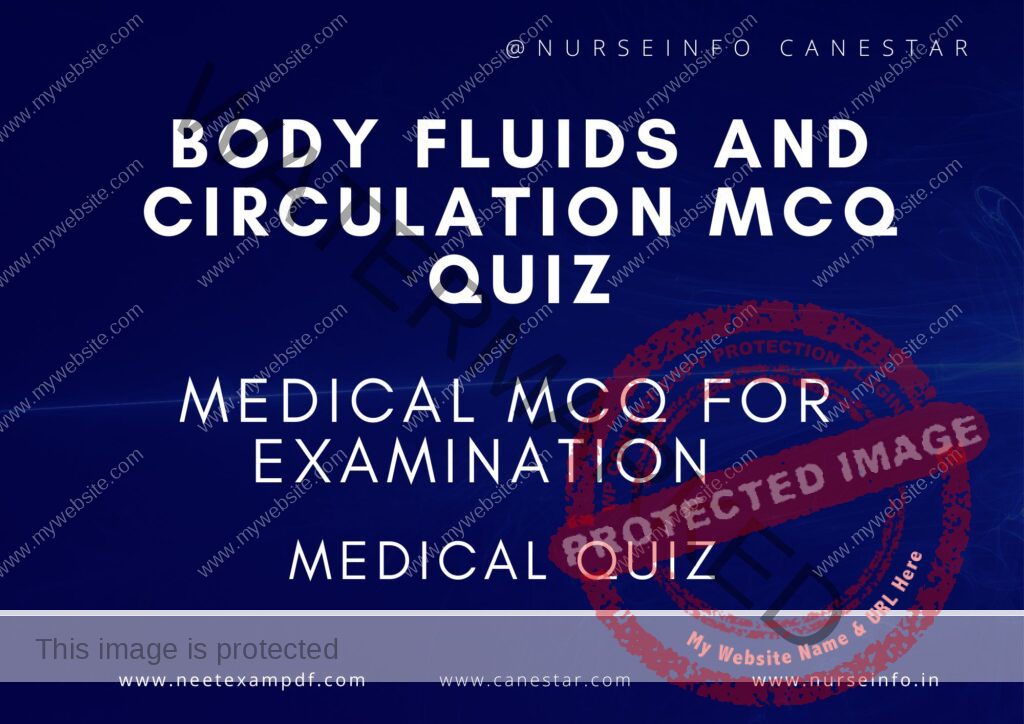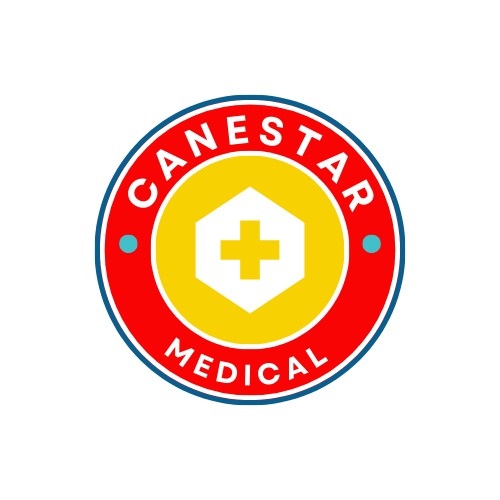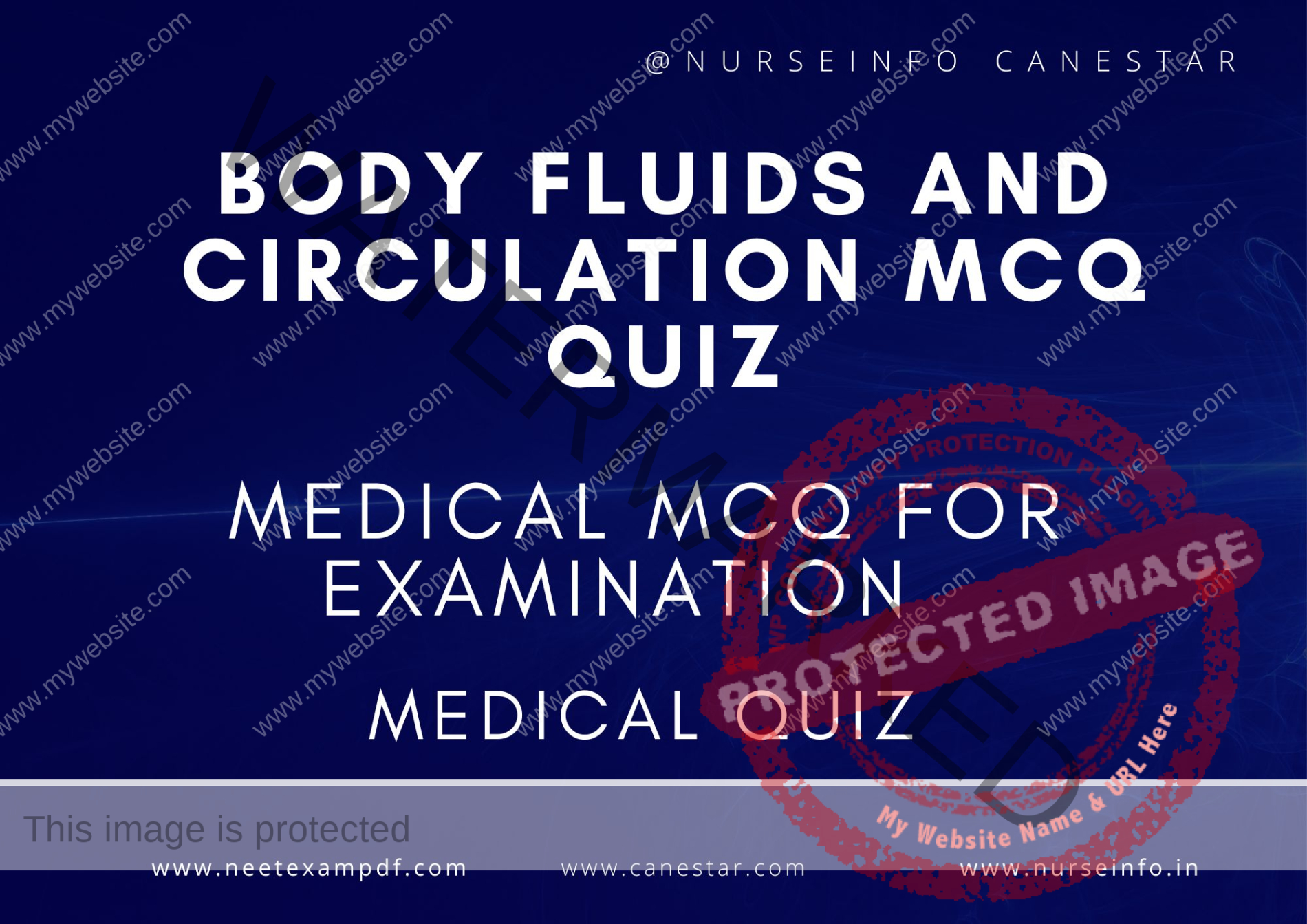MULTIPLE CHOICE QUESTIONS ON BODY FLUIDS AND CIRCULATION QUIZ – MCQS WITH RATIONALE ANSWER – BODY FLUIDS AND CIRCULATION MCQ QUESTIONS WITH RATIONALE
MCQ FOR BODY FLUIDS AND CIRCULATION QUIZ
These mcqs are prepared exclusively for medical professionals for exam preparation. MCQ is helpful to remember the concept on body fluids and circulation practice mcq quiz. This multiple choice questions are helpful for preparation for DHA, PROMETRIC, MOH, HAAD, NCLEX, Medical, NEET and Nursing EXAMINATION
BODY FLUIDS AND CIRCULATION MCQ QUIZ
Body Fluids and Circulation MCQs with Rationale Answers
What is the primary component of blood plasma?
a) Red blood cells
b) Platelets
c) Water
d) White blood cells
Answer: c) Water
Rationale: Blood plasma is about 90% water, which acts as a solvent for carrying other components such as proteins, glucose, electrolytes, hormones, and waste products.
Which type of white blood cell is primarily responsible for producing antibodies?
a) Neutrophils
b) Basophils
c) Lymphocytes
d) Eosinophils
Answer: c) Lymphocytes
Rationale: Lymphocytes, particularly B-lymphocytes, are responsible for producing antibodies that target specific pathogens for destruction.
Which blood cells are involved in clotting?
a) Erythrocytes
b) Leukocytes
c) Platelets
d) Lymphocytes
Answer: c) Platelets
Rationale: Platelets, also known as thrombocytes, play a critical role in blood clotting by forming a plug at the site of injury and facilitating the coagulation process.
What is the main function of hemoglobin in red blood cells?
a) To produce antibodies
b) To transport oxygen
c) To fight infections
d) To carry nutrients
Answer: b) To transport oxygen
Rationale: Hemoglobin is a protein in red blood cells that binds to oxygen in the lungs and releases it to tissues throughout the body.
Which blood vessel carries oxygenated blood from the lungs to the heart?
a) Pulmonary artery
b) Pulmonary vein
c) Aorta
d) Superior vena cava
Answer: b) Pulmonary vein
Rationale: The pulmonary veins carry oxygenated blood from the lungs to the left atrium of the heart.
What is the primary function of the lymphatic system?
a) To produce red blood cells
b) To transport nutrients
c) To remove waste products from tissues
d) To maintain fluid balance and defend against infections
Answer: d) To maintain fluid balance and defend against infections
Rationale: The lymphatic system helps maintain fluid balance by returning excess tissue fluid to the bloodstream and plays a crucial role in immune defense by transporting lymph, which contains white blood cells.
Which ion is most abundant in the extracellular fluid?
a) Potassium
b) Sodium
c) Calcium
d) Magnesium
Answer: b) Sodium
Rationale: Sodium is the most abundant ion in the extracellular fluid and is essential for maintaining fluid balance, nerve function, and muscle contraction.
What is the average pH of blood?
a) 6.5
b) 7.0
c) 7.4
d) 8.0
Answer: c) 7.4
Rationale: The average pH of blood is approximately 7.4, which is slightly alkaline and is tightly regulated to ensure proper cellular function.
Which hormone regulates the production of red blood cells?
a) Erythropoietin
b) Insulin
c) Glucagon
d) Aldosterone
Answer: a) Erythropoietin
Rationale: Erythropoietin, produced primarily by the kidneys, stimulates the production of red blood cells in response to low oxygen levels in the blood.
What is the primary function of albumin in the blood?
a) To transport oxygen
b) To fight infections
c) To maintain osmotic pressure
d) To aid in blood clotting
Answer: c) To maintain osmotic pressure
Rationale: Albumin is the most abundant plasma protein and plays a crucial role in maintaining osmotic pressure, which helps regulate the distribution of fluids between blood vessels and tissues.
Which of the following is a major component of the body’s extracellular fluid?
a) Cytoplasm
b) Interstitial fluid
c) Intracellular fluid
d) Mitochondrial matrix
Answer: b) Interstitial fluid
Rationale: Interstitial fluid is the fluid that surrounds the body’s cells and is a major component of extracellular fluid, along with plasma.
Which part of the heart pumps deoxygenated blood to the lungs?
a) Left atrium
b) Right atrium
c) Left ventricle
d) Right ventricle
Answer: d) Right ventricle
Rationale: The right ventricle pumps deoxygenated blood through the pulmonary artery to the lungs for oxygenation.
What is the primary role of the spleen in the circulatory system?
a) To produce red blood cells
b) To filter and store blood
c) To produce hormones
d) To regulate blood pressure
Answer: b) To filter and store blood
Rationale: The spleen filters blood, removing old and damaged red blood cells, and also stores blood that can be released in case of hemorrhage.
Which component of blood is involved in immune responses and the production of antibodies?
a) Red blood cells
b) Platelets
c) Plasma
d) White blood cells
Answer: d) White blood cells
Rationale: White blood cells (leukocytes) are involved in immune responses, including the production of antibodies and the destruction of pathogens.
Which artery supplies oxygen-rich blood to the brain?
a) Coronary artery
b) Carotid artery
c) Femoral artery
d) Pulmonary artery
Answer: b) Carotid artery
Rationale: The carotid arteries supply oxygen-rich blood to the brain, ensuring its proper function.
What is the function of the valves in veins?
a) To prevent backflow of blood
b) To pump blood
c) To oxygenate blood
d) To store blood
Answer: a) To prevent backflow of blood
Rationale: Valves in veins prevent the backflow of blood, ensuring it moves in one direction toward the heart.
Which plasma protein plays a key role in blood clotting?
a) Albumin
b) Fibrinogen
c) Globulin
d) Hemoglobin
Answer: b) Fibrinogen
Rationale: Fibrinogen is a plasma protein that is converted to fibrin during blood clotting, forming a mesh that helps stop bleeding.
Which vessel carries oxygenated blood from the heart to the body?
a) Pulmonary vein
b) Pulmonary artery
c) Aorta
d) Superior vena cava
Answer: c) Aorta
Rationale: The aorta is the largest artery in the body and carries oxygenated blood from the left ventricle to the systemic circulation.
What is the main function of the lymph nodes?
a) To produce red blood cells
b) To filter lymph and trap pathogens
c) To produce hormones
d) To regulate body temperature
Answer: b) To filter lymph and trap pathogens
Rationale: Lymph nodes filter lymph, trapping pathogens and foreign particles, and play a key role in the immune response.
Which hormone helps regulate sodium and water balance in the body?
a) Insulin
b) Glucagon
c) Aldosterone
d) Adrenaline
Answer: c) Aldosterone
Rationale: Aldosterone, produced by the adrenal glands, helps regulate sodium and water balance by promoting sodium reabsorption in the kidneys.


